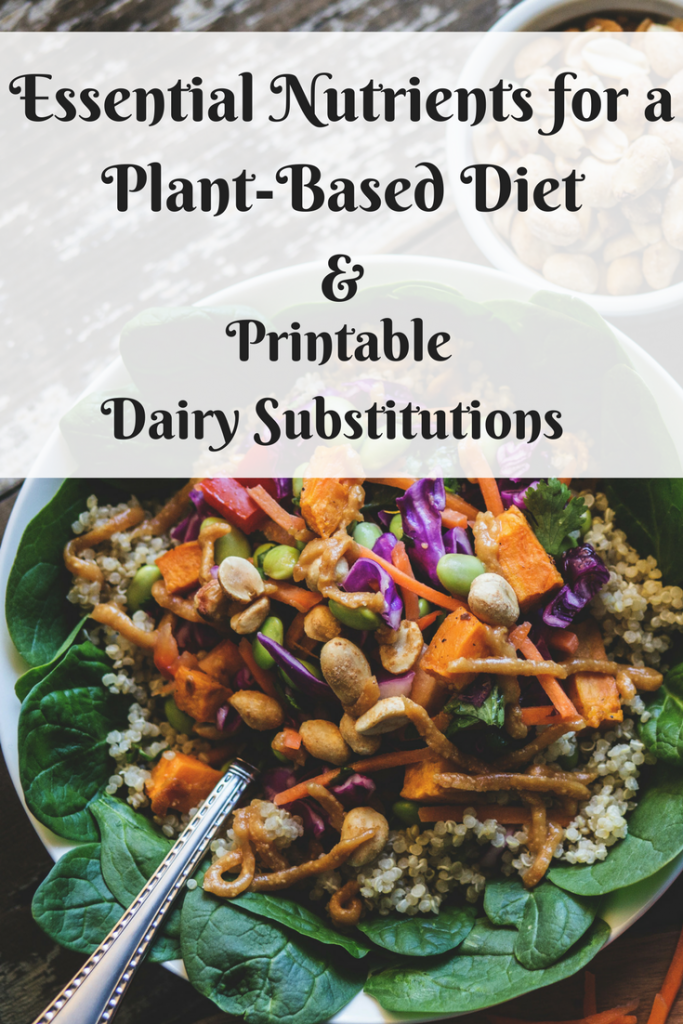
Essential Nutrients for a Plant-Based Diet
Following a plant-based diet, dairy-free or vegan diet is a big commitment, but one that does wonders for your health. If you are still on the fence about it, whether you follow a vegetarian or
meat-eating diet, here are some ways you can benefit:
Reduce your risk for type 2 diabetes
Encourage more healthy foods
Prevent heart disease and stroke
Lower your blood pressure and cholesterol
Lose weight naturally
Reduce the risk for some cancers
While going plant-based can be extremely good for your physical and mental health, you also
need to think about the nutrients you consume. If you follow the plant-based diet the
right way, you should be eating primarily whole and clean foods, like veggies and fruits,
nuts and nut butter, nut milk, seeds, no dairy or animal products and whole grains. Eliminating dairy can be difficult. With this post I am including a Dairy Substitutions Printable.
If you aren’t sure what nutrients you might be missing when you switch to a plant-based diet,
the following list can be helpful to help boost your nutrient content and why.
Protein
The first nutrient you need to have while on any plant-based diet is protein. If you are
going from a standard meat-eating diet, you probably got most of your protein from
meat, poultry, fish, eggs, and dairy products. You can no longer have these items, so
you will need to look for other options when adding in the protein. Dairy is a huge area that most people get their protein from. Check out the Printable Dairy Substitution List below!
Protein is an essential protein that not only helps to provide energy to help you get
through your day, but is good for your organs, bones, skin, and even your muscles. As
you will see in the next part of this report, there are plenty of vegan foods you can enjoy
to get all the protein you need.
Iron
It should come as no surprise that you also need to get your iron in. If you have ever felt
faint or lightheaded, or like you just have no energy during the day, lack of iron might be
the culprit. Switching from meat-eating diets can lead to not eating enough iron if your aren’t
eating lots of green veggies like spinach.
With iron, you are helping to improve the production of red blood cells, which provide
essential oxygen for your body. Not only are there meatless options for getting more
iron without eating meat, but they can also provide vitamin C, also helping you to absorb
more iron into your body.
Vitamin D
Don’t forget about the vitamin D! As you might know, a really good natural source for
vitamin D is sunlight, which you get just by being outside and exposed to the sun’s UV
rays. However, this is not an option for many people, so they try to get their vitamin D
either through food or with supplements. Perhaps you work inside an office all day, or
you live in a colder climate with fewer sunny days.
Vitamin D is essential for promoting good bone health, as well as helping your body to
absorb calcium from the foods you eat. On a plant-based diet, you can’t get vitamin D from
sources like milk, so you will look elsewhere. Even when I was eating animal products and dairy, I didn’t have enough Vit D. You can see my Vitamin D Story here.

Vitamin B12
Another vitamin that you want to make sure you get plenty of while on your plant-based diet is
vitamin B12. B12 is frequently increased by taking a supplement each day and placing it under your tongue, often the easiest choice for many people. If you get blood work done and you have a vitamin
deficiency of B12, doctors often recommend that supplement. B12 can be gotten from diet by eating foods like fortified fiber cereal and soy milk.
Calcium
Naturally, if you are not consuming dairy, you will need another food source for your
calcium. Calcium builds strong bones, but it also helps you to keep away diseases and
medical conditions that can weaken the bones over time. You can reduce the risk of
conditions like osteoporosis just by having more calcium in your diet.
So what do you do when you are plant-based and can’t have dairy? Soy is a good option,
but many people have a sensitivity to soy. If this is you, you can still get calcium from
veggies like kale, bok choy, broccoli, spinach, and mustard greens. Orange juice, soy
milk, and almond milk also contains some calcium.
Zinc
Zinc is another nutrient you want to focus on getting through a healthy plant-based diet. This
is actually pretty easy to get, since it is in many of the plant-based staples you probably
already eat on a regular basis. You will get zinc in nuts, soy, and beans for the most
part, as well as some veggies. Zinc is good for your immune system and overall health,
so don’t let this nutrient get too low.
Omega-3 Fatty Acids
Lastly, make sure you are getting an adequate amount of omega-3 fatty acids. These
are good for overall health, brain and memory function, and heart health. The two main ways
to get your omega-3s though plants are with oil and flaxseed meal.

[…] helpful resources on her blog site consist of a guide on dairy replacements and a post on the various actions to require to have excellent gut […]